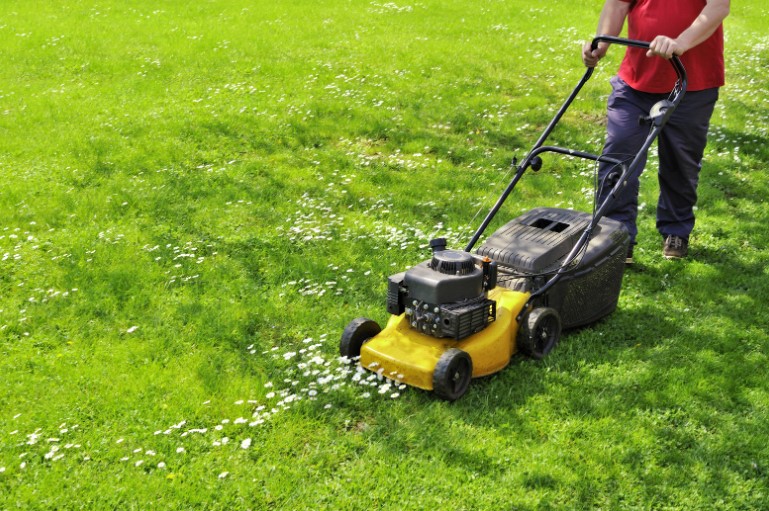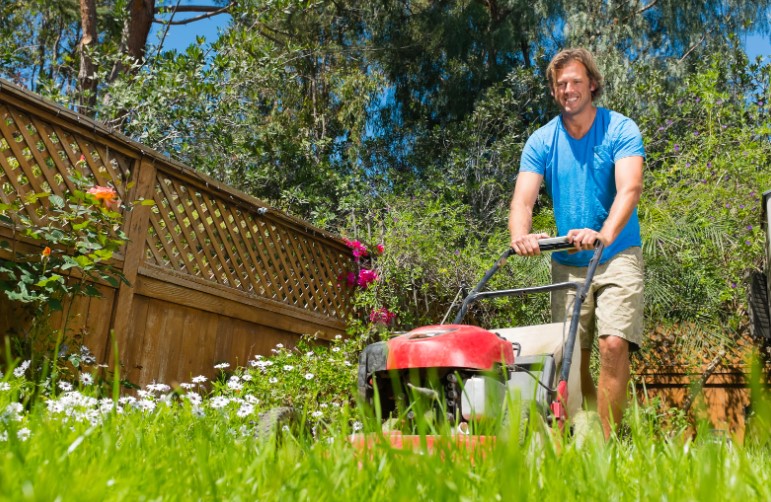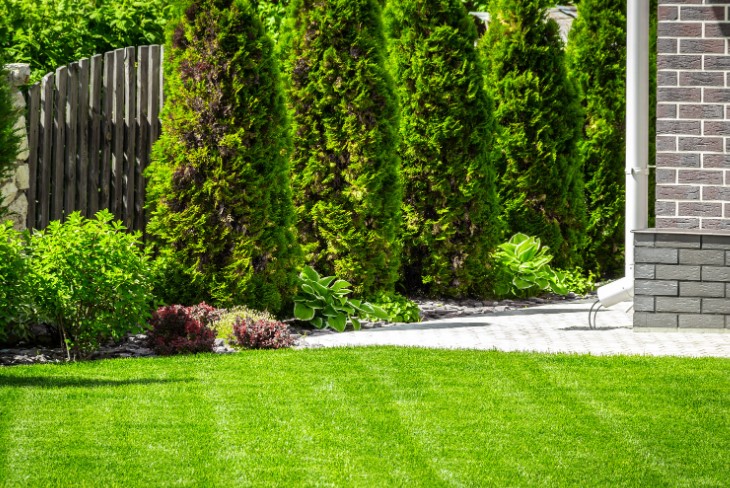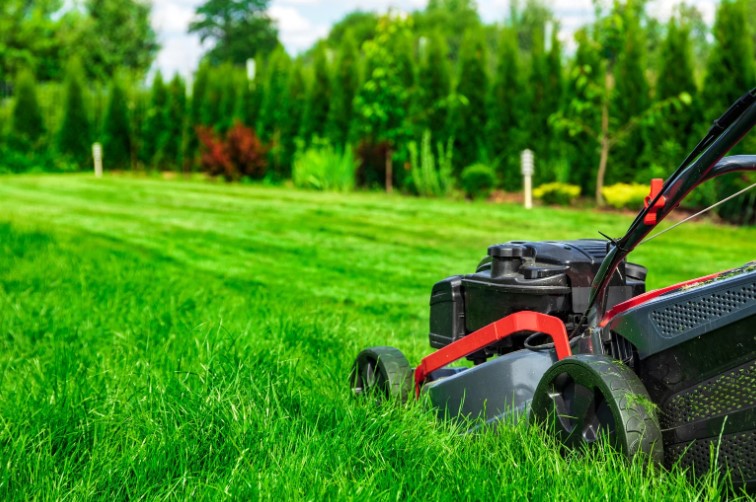- Is It Safe to Cut Wet Grass with an Electric Mower?
- Can You Cut Wet Grass With an Electric Lawn Mower?
- What are the Best Practices for Mowing Wet Grass with an Electric Lawn Mower?
- Can Electric Mowers Handle Wet Grass Better Than Petrol Mowers?
- What Precautions Should You Take If You Must Mow Wet Grass with an Electric Mower?
- Should You Use an Electric Lawn Mower on Wet Grass?
- FAQs About Using Electric Mowers on Wet Grass
Lawn maintenance is a crucial part of home care, but weather conditions can make it challenging. After a rain shower, you might be tempted to cut the wet grass to keep your lawn looking neat.
But when using an electric lawn mower, is it safe to mow wet grass? In this guide on can you cut wet grass with an electric lawn mower, we’ll explore whether you can, or should, use an electric mower on wet grass and offer tips on how to do so safely if needed.
Is It Safe to Cut Wet Grass with an Electric Mower?
The short answer is no—cutting wet grass safely with an electric lawn mower is generally not recommended. Here’s why:
- Water and Electricity Don’t Mix: The most obvious danger is the risk of electrocution. Water conducts electricity, and if your electric mower comes into contact with moisture—whether through wet grass or puddles on the lawn—there is a significant risk of an electrical short circuit. This could potentially harm you or damage the mower’s electrical components.
- Corded vs. Cordless Mowers: For corded electric mowers, the risk is higher due to the power cord being exposed to wet conditions, which could lead to electric shock. Even with cordless (battery-powered) mowers, water can still seep into the internal components and cause a malfunction.
- Mower Damage: Wet grass can clog the mower’s deck, and the moisture can infiltrate sensitive parts like the motor or battery, leading to rust and corrosion over time. This not only shortens the lifespan of your mower but also reduces its performance.
While there may be times when you feel the need to mow wet grass, safety should always be the top priority.
Can You Cut Wet Grass With an Electric Lawn Mower?
Why Cutting Wet Grass With an Electric Lawn Mower is Risky?
Mowing a wet lawn poses specific risks, particularly when using an electric mower. Here’s why:
- Electrical Hazards: As mentioned earlier, electricity and water can create dangerous situations. Even if the mower appears to be working, moisture inside the device can cause it to short-circuit, leading to potential shock or fire hazards. Additionally, water can enter the electrical components, leading to irreversible damage.
- Slippage: Wet grass is slicker, meaning there’s a higher chance of slipping while mowing. A slip while holding an electric mower could cause you to lose control of the machine, which could result in personal injury or damage to the mower.
- Impact on Mower Efficiency: Wet grass clumps together and can block the blades and the mower deck, making the machine less efficient. This means you’ll likely have to stop frequently to clear out the grass, which is both inconvenient and increases wear on the mower.
For these reasons, using an electric mower in wet conditions is something to avoid when possible.
How Does Wet Grass Affect an Electric Lawn Mower’s Performance?
While electric mowers offer several advantages, including being eco-friendly and quieter than petrol mowers, they are more sensitive to moisture. Here’s how wet grass impacts their performance:
- Blade Clogging: Wet grass is denser and tends to stick to the blades and undercarriage of the mower. This can clog the mower’s cutting deck, causing the blades to slow down and cut less efficiently. Over time, this could lead to dull blades, requiring more frequent sharpening.
- Motor Strain: When the blades are clogged, the motor has to work harder to spin the blades. This strain can lead to overheating or even motor failure in extreme cases. For cordless electric mowers, this additional load will also drain the battery faster, reducing the runtime.
- Reduced Cutting Quality: Wet grass tends to bend and lie flat, making it difficult for the blades to make a clean cut. This can result in a patchy, uneven lawn, requiring additional passes with the mower. In some cases, the mower may simply push the wet grass down without cutting it at all.
In summary, wet grass diminishes the efficiency and performance of electric mowers, leading to more maintenance and potentially costly repairs.
What are the Best Practices for Mowing Wet Grass with an Electric Lawn Mower?
If you find yourself in a situation where you must mow wet grass with an electric mower, here are some best practices to follow to reduce risks and damage:
- Inspect the Lawn First: Before mowing, check the lawn for puddles and excess water. While damp grass may be manageable, mowing through waterlogged grass is extremely unsafe.
- Raise the Mower Height: Increase the cutting height to prevent the blades from overloading with wet grass. This will reduce the chance of clogging and make the mower’s job easier. It may also help avoid tearing the grass, which is more likely when it’s wet.
- Mow Slowly: When cutting wet grass, go slower than usual. This gives the mower time to process the thicker, heavier grass without overwhelming the motor.
- Take Frequent Breaks: Wet grass can accumulate quickly under the mower. Pause frequently to turn off the machine and clean out the deck and blades. This will prevent the motor from overheating and ensure a smoother cut.
- Dry the Mower After Use: Once you’re done, thoroughly clean and dry the electric mower. Remove any wet grass clippings from the blades, deck, and motor casing to prevent rust and damage to the machine’s electrical components.
By following these practices, you can reduce the risk of damaging both your lawn and your mower when mowing under less-than-ideal conditions.

Can Electric Mowers Handle Wet Grass Better Than Petrol Mowers?
There’s often a debate about whether electric mowers or petrol mowers perform better on wet grass. Here’s a quick comparison:
- Power: Petrol mowers generally have more cutting power, making them better equipped to handle thick, wet grass without clogging as easily. Electric mowers, while quieter and more eco-friendly, may struggle with the density of wet grass.
- Weight: Electric mowers are typically lighter than petrol mowers, which can be a disadvantage on wet grass. A heavier mower can press down on the grass more effectively, ensuring a cleaner cut, whereas a lighter electric mower might ride over the wet grass without cutting it properly.
- Maintenance: Electric mowers are easier to maintain but are more sensitive to moisture. Petrol mowers, while more robust in wet conditions, require more maintenance due to their engines.
In conclusion, while electric mowers can cut wet grass in a pinch, petrol mowers are generally better suited for handling damp conditions.
What Precautions Should You Take If You Must Mow Wet Grass with an Electric Mower?
If you have no choice but to mow wet grass with an electric lawn mower, there are some important precautions to keep in mind:
- Wear Appropriate Footwear: Ensure you have good traction by wearing sturdy shoes with good grip. This helps prevent slipping while operating the mower on a wet surface.
- Use a GFCI-Protected Outlet: If you are using a corded electric mower, always plug it into a Ground Fault Circuit Interrupter (GFCI) outlet. This will automatically cut off the power if there’s an electrical fault, helping to prevent electric shock.
- Mow in Dry Intervals: If it’s still raining or drizzling, wait until it stops. Allow the grass to dry for as long as possible before mowing, reducing the risks of electrical hazards.
- Inspect the Cord (if applicable): For corded electric mowers, check the power cord for any signs of damage or fraying before you begin mowing. A damaged cord can lead to electrocution, especially in wet conditions.
Taking these precautions will help you avoid the most serious risks when mowing wet grass with an electric mower.
Should You Use an Electric Lawn Mower on Wet Grass?
While it is technically possible to mow wet grass with an electric lawn mower, it’s not recommended due to the numerous risks involved, including electrical hazards, mower damage, and harm to your lawn.
If you must mow wet grass, follow the safety tips and best practices discussed here to reduce risks. Ultimately, waiting for the grass to dry is the safest and most effective approach for both your mower and your lawn. Certainly there are ways to mow lawn without the lawn mower.

FAQs About Using Electric Mowers on Wet Grass
1. Can I use my electric mower after it rains?
It’s best to wait until the grass has dried somewhat after it rains. If the grass is still too wet, the risks of electrical hazards, mower damage, and a poor-quality cut are high.
2. Will mowing wet grass with an electric mower damage the lawn?
Yes, mowing wet grass can tear the blades of grass instead of cutting them cleanly. This leaves the lawn vulnerable to diseases and fungal infections, which thrive in damp conditions.
3. How do I safely clean an electric mower after cutting wet grass?
First, unplug the mower or remove the battery to ensure there’s no power running through it. Use a brush or cloth to clean off any grass clippings from the blades and deck. Make sure to let the mower dry completely before storing it.
4. Should I sharpen the blades after using an electric mower on damp grass?
Yes, cutting wet grass dulls the blades faster, so sharpening them after use will ensure a clean, effective cut the next time you mow.



0 Comments